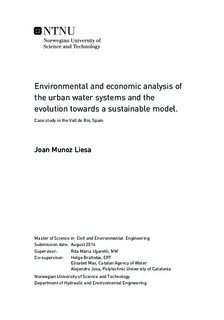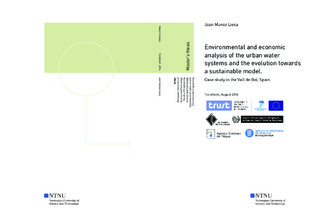| dc.description.abstract | The upcoming challenges such as the increasing urban needs or the impact of climate change in the urban water systems are driving management and planning focus towards sustainability. In response, many European directives and guidelines, and studies around the world are considering a holistic view of urban water systems while considering the flowing water as a valuable resource and achieving a circular water cycle.
In this work, the Dynamic Metabolism Model (DMM) has been used to analyze and draw special attention in future interventions and strategies to give sustainability assessment. This model has been carried out in a real case study in the Vall de Boí, Pyrenees, Spain. The DMM is based in the Model Flow Analysis (a LCA approach) that intends to quantify the needed inputs and the outputs from the urban water system (UWS) metabolism. It consttutes the first step to achieve a full internalization of costs of the UWS. The present analysis as well as future interventions and scenarios are developed after consulting stakeholders involved. It intends to undersand the impacts. Beyond the case studied, this work aims to demonstrate the DMM as a powerful tool that can usefully help stakeholders into the decision-making process contributing to a sustainable urban water planning and policy. | |

